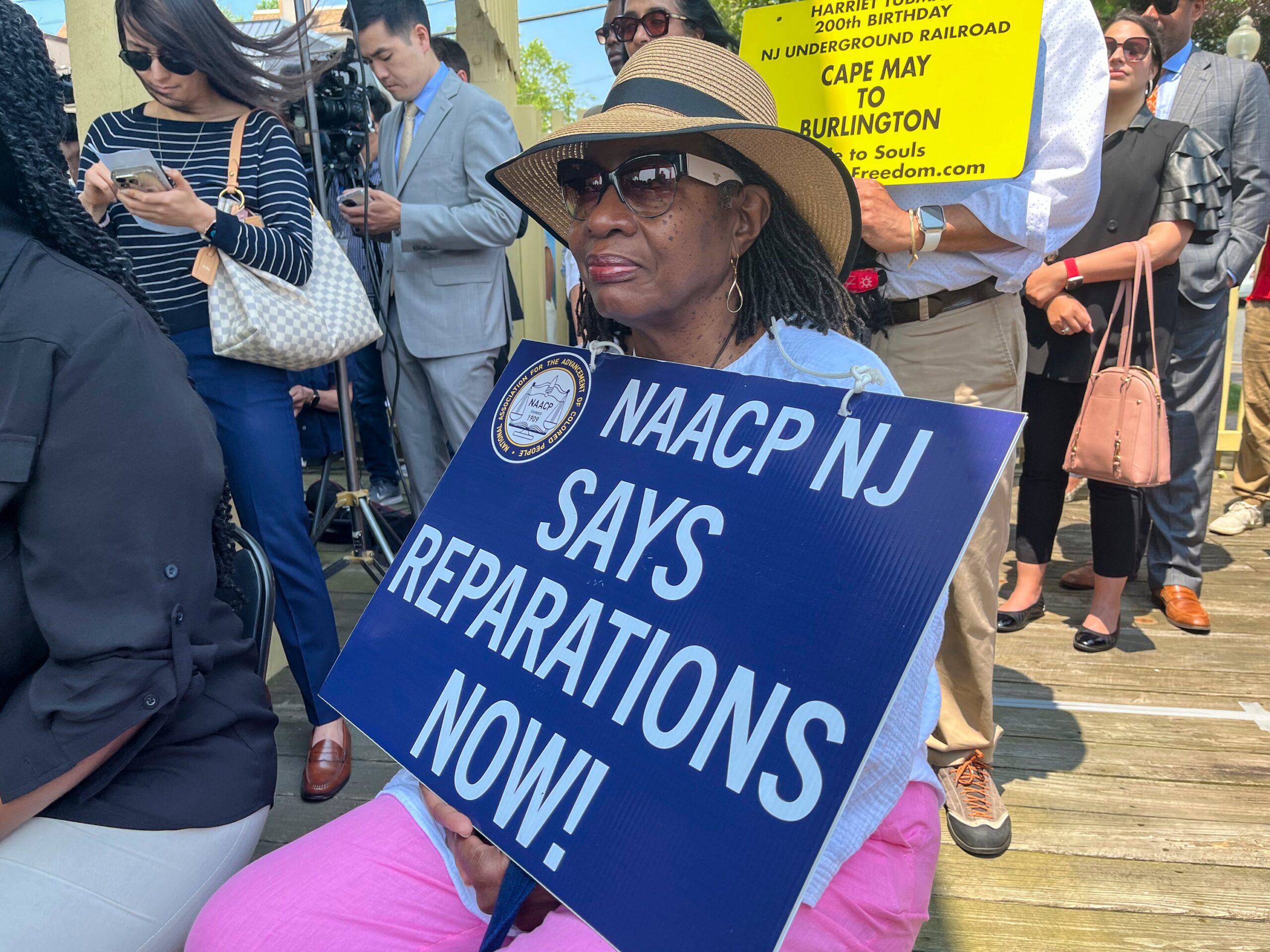On Monday, June 19, 2023, Deborah Smith Gregory, president of the Newark NAACP, displays a sign at the Reparations Council launch by the New Jersey Institute for Social Justice.Richards, Ande
The New Jersey Institute for Social Justice (NJISJ) said on Juneteenth of last year that it will bring together a group of influential people to study and advocate for reparations in New Jersey.
The revelation was made at a pier in Perth Amboy, Middlesex County, where Africans who had been sold into slavery were made to work on railroads, farms, mines, and other jobs. According to the NJISJ, their labor produced wealth for their enslavers and established the framework for New Jersey’s infrastructure.
The Reparations Council was chaired by Jean-Pierre Brutus, senior lawyer in the NJISJ’s Economic Justice Program, and consisted of nine committees and 58 co-chairs.
In its report, For Such a Time as This: The Nowness of Reparations for Black People in New Jersey, published on Thursday, June 19, commonly known as Juneteenth, the Council analyzed the state’s history and its relationship to the current racial environment, finally formulating 93 recommendations.
The following are some of the main suggestions made in the report:
1. Democracy
-
Expand voting rights protections for Black residents.
2. Fairness in the Economy
-
Provide direct cash reparations payments to Black New Jerseyans to close the racial wealth gap.
-
Develop transformative economic policies in conjunction with direct payments to ensure systemic and institutional change.
-
Invest in Black entrepreneurship, financial access, and targeted wealth-building initiatives.
3. Justice for the Environment
-
Clean up toxic waste sites in Black communities.
-
Enforce environmental regulations to protect the health and living conditions of Black residents.
-
Invest in sustainable infrastructure for Black neighborhoods to address environmental racism.
4. Postsecondary Education
-
Expand scholarship and grant programs for Black students.
-
Fund programs to increase Black enrollment and retention at colleges and universities.
-
Require higher education institutions to examine and address their historical ties to slavery and racial exclusion.
5. Equity in Health
-
Invest in healthcare infrastructure and targeted programs to reduce racial health disparities.
-
Expand access to mental health and reproductive health services for Black communities.
-
Develop culturally competent health programs to improve life expectancy and outcomes.
6. New Jersey’s segregation
-
Create policies to desegregate schools and neighborhoods.
-
Reform zoning and housing policies that perpetuate racial segregation.
-
Fund affordable housing initiatives to increase Black homeownership.
7. Narrative & Public Education
-
Issue a revised state apology for slavery, acknowledging current harms.
-
Expand and permanently fund theAmistad Curriculum
to include reparations education at all levels.
-
Protect educators who teach accurate Black history.
8. Justice & Public Safety
-
Reform policing and criminal justice practices that disproportionately harm Black people.
-
Develop community-based alternatives to policing.
9. Black Resistance & Faith
-
Require religious institutions that benefited from slavery to engage in reparations reckonings.
-
Provide direct investments to support Black faith institutions.
Alongside Taja-Nia Henderson, dean of the Graduate School at Rutgers Newark, Khalil Gibran Muhammad, the first professor of African American Studies and Public Affairs at Princeton University, co-chaired the New Jersey Reparations Council.
According to Muhammad, this report is the most thorough examination of New Jersey’s history ever written, and acknowledging what has transpired is essential to restitution. I’m struck by the report’s scope as a historian and academic because it covers everything up to the present, including the most recent evidence on environmental effects.
In addition to serving on the Democracy Committee of the Reparations Council, Lawrence Hamm is the founder and chair of the social justice advocacy group People’s Organization for Progress. The study will be used in its continuing restitution campaign, he said.
We have even more ammo in the fight for compensation because to this analysis,” Hamm added. Additionally, we will be contacting forums. In addition to educating our own membership, we will be visiting with our politicians.
Muhammad stated that the Council wants the public to read the report in order to learn and comprehend exactly what transpired in New Jersey with regard to Black history, following two years of study, community feedback, and 93 recommendations.
“As a first step, we do not want the New Jersey legislature to commission its own study bill,” he stated. We’ve completed the task. In order for the suggestions to be passed, we want the legislature to take them into consideration and move forward with specific policy recommendations outside of committee.
The Council has published a comprehensive narrative of New Jersey’s history of slavery and the centuries of racial injustice that still exist today, according to Ryan Haygood, president and CEO of NJISJ.
According to Haygood, the Council, the Institute, and other supporters and partners will now endeavor to educate communities throughout New Jersey about this sometimes disregarded and even unknown past. We will collaborate to encourage the legislators to implement the report’s recommendations based on that basis of knowledge and truth.








